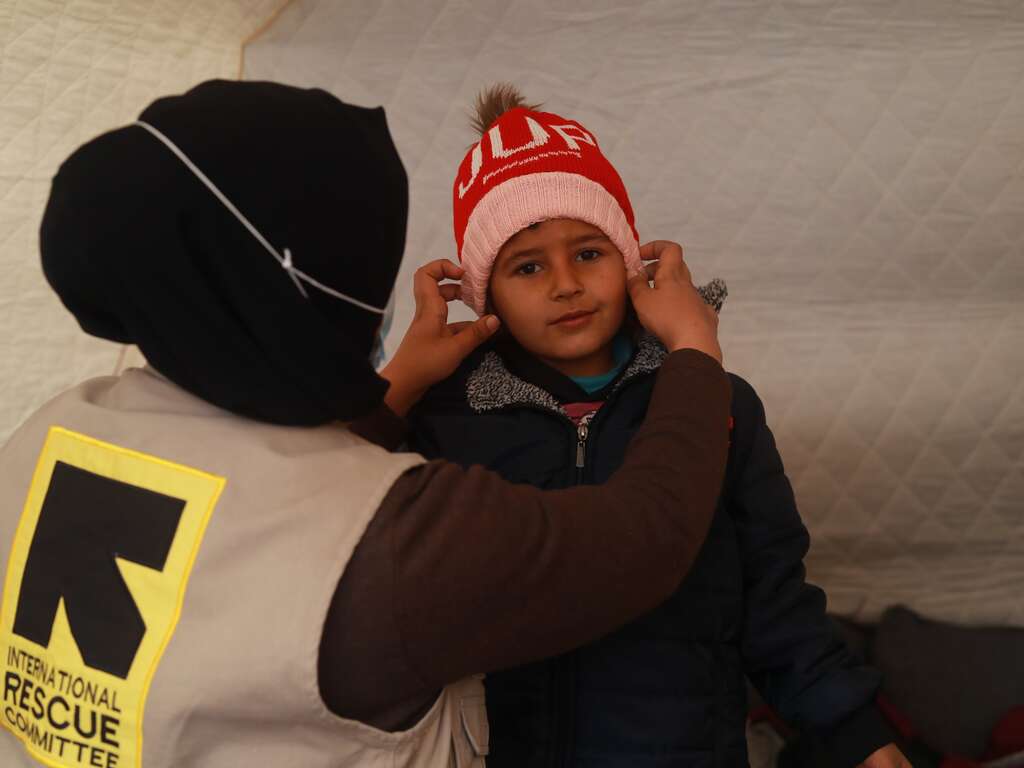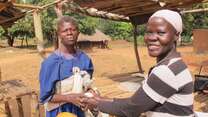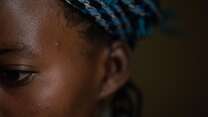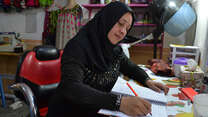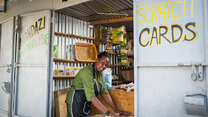SOUTH KIVU PROVINCE, Democratic Republic of Congo (DRC) - When Chantal attended the information meeting on village savings and loans associations (VSLA), she left incredulous. The facilitator had just told the women from her village that they if they formed a collective to save money and take out loans, they would receive their cash back, plus accumulated interest.
“I have never been able to put money aside—never,” says Chantal. “How would I, all of a sudden, be able to save on a weekly basis?” She was also hesitant to pool her money with other women, as she didn’t know how much she could trust them.
A year later, Chantal is amazed at the cash she holds in her hands. Her VSLA, which she formed with 24 fellow villagers, just held its “share-out,” the end point of the group’s savings cycle. In a dark mud hut, VSLA members crowded around the communal safety deposit box. One by one they were called to present their passbooks, where ink stamped stars denoted the number of shares each of them had bought every week during the past months. Chantal, who cannot read or write, had only a vague idea of how much cash she would receive. She certainly didn’t expect it to be in excess of 80,000 Congolese francs (£53)—a small fortune in this area, where most families make ends meet with 60p a day or less.
Ecstatic, Chantal said she would use the money to buy a goat and maybe start a small business selling beer in her village. More importantly, she is relieved she now can pay the school fees for her children.
Across the Democratic Republic of Congo’s conflict-afflicted South Kivu province, 40 International Rescue Committee-supported VSLAs had their share-outs this spring, disbursing almost £31,350 to the 871 women who successfully completed the programme. Women once destitute are now opening small businesses, acquiring plots of lands, raising animals, paying school fees and contributing to daily expenses in their households. Many of them never dreamed they themselves could afford £20 to buy a 20-litre drum of palm oil or spend £30 or more for a goat. All told, members saw an increase of over 42% on their initial savings. An additional seven VSLAs will hold their share-outs in the coming months.
“We are acutely aware that providing women with access to funds is key to empowerment and to helping them find their voice,” says Dalita Cetinoglu, director of the IRC’s women’s protection and empowerment programme that oversees the VSLAs. “The DRC can only heal and recover if the women themselves do so, and have the immense contribution they make to their families and communities recognised.”
Based on successful VSLA experiences in other countries, including Burundi, Liberia, Sierra Leone and Uganda, the IRC initiated this programme in South Kivu in 2010. Since then, the IRC has guided 42 VSLAs through the initial savings cycle, which varies from nine to twelve months. The IRC does not provide start-up capital nor does it influence how women choose the members of each group.
“They must be serious but easy to work with,” says Chantal. Other VSLA members say they self-select themselves based on their reputations for being honest, generous and “full of love.”
Once the groups are formed, it is up to each of them to decide the value of their shares, the amount of the interest applied to loans throughout the cycle, and the penalties levied in case of misconduct. Apart from buying shares (up to five per member per weekly meeting), participants create a solidarity fund, to which they contribute 20 cents each time they convene. The fund is used to support members and their families who may need short-term financial assistance in the case of births, marriages, illnesses or deaths.
After they cash their shares in, the overwhelming majority of the women decide to start new groups. Now confident that they can actually save money, most groups raise the value of the shares and interest. Equally important, women now feel appreciated in their homes and communities as never before.
“For the first time, my husband is consulting me when making decisions at home,” says Francine, a VSLA member. “He says I am worth it now since I can bring money to the table.”
Another member, Vanessa, takes pride that her VSLA set an example for the men in her community. “Our husbands saw the good work we were doing, and they decided to take after us,” she says. “We explained to them how it works, so they formed their own savings group.”
In the last year, the IRC expanded its VSLA programme to neighbouring North Kivu province, establishing eight associations and offering business-skills training and a discussion series between VSLA members and their spouses on household finances.
Regrettably, North Kivu province lately has experienced a surge of armed violence and large population displacement, which has set back most VSLA activities. The programme is slowly picking up speed again, but security – both for VSLA members and for the IRC staff - remains a serious concern.
Article by Sinziana Demian, Photography by Daniela Greco, Benedicte de la Taille, Sinziana Demian
